KZN’S HIGHWAY OF DEATH
KZN’s deadly, truck-heavy highways need relief from a functioning rail network
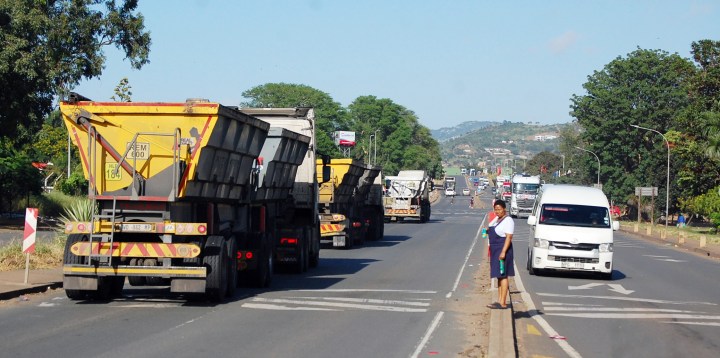
An increase in global demand for coal, coupled with South Africa’s crumbling rail network, has seen KwaZulu-Natal bear the brunt of heavy-duty traffic to and from ports such as Durban and Richards Bay. Daily Maverick visited some of the areas most affected.
Heavy-duty trucks transporting industrial goods are running at unprecedented levels on the N3 between Durban and Johannesburg, and on the N2 between Richards Bay and the Mpumalanga coalfields.
According to figures from the KZN transport department, last year saw a fivefold increase in traffic on the N2 that runs through Pongola from the coast.
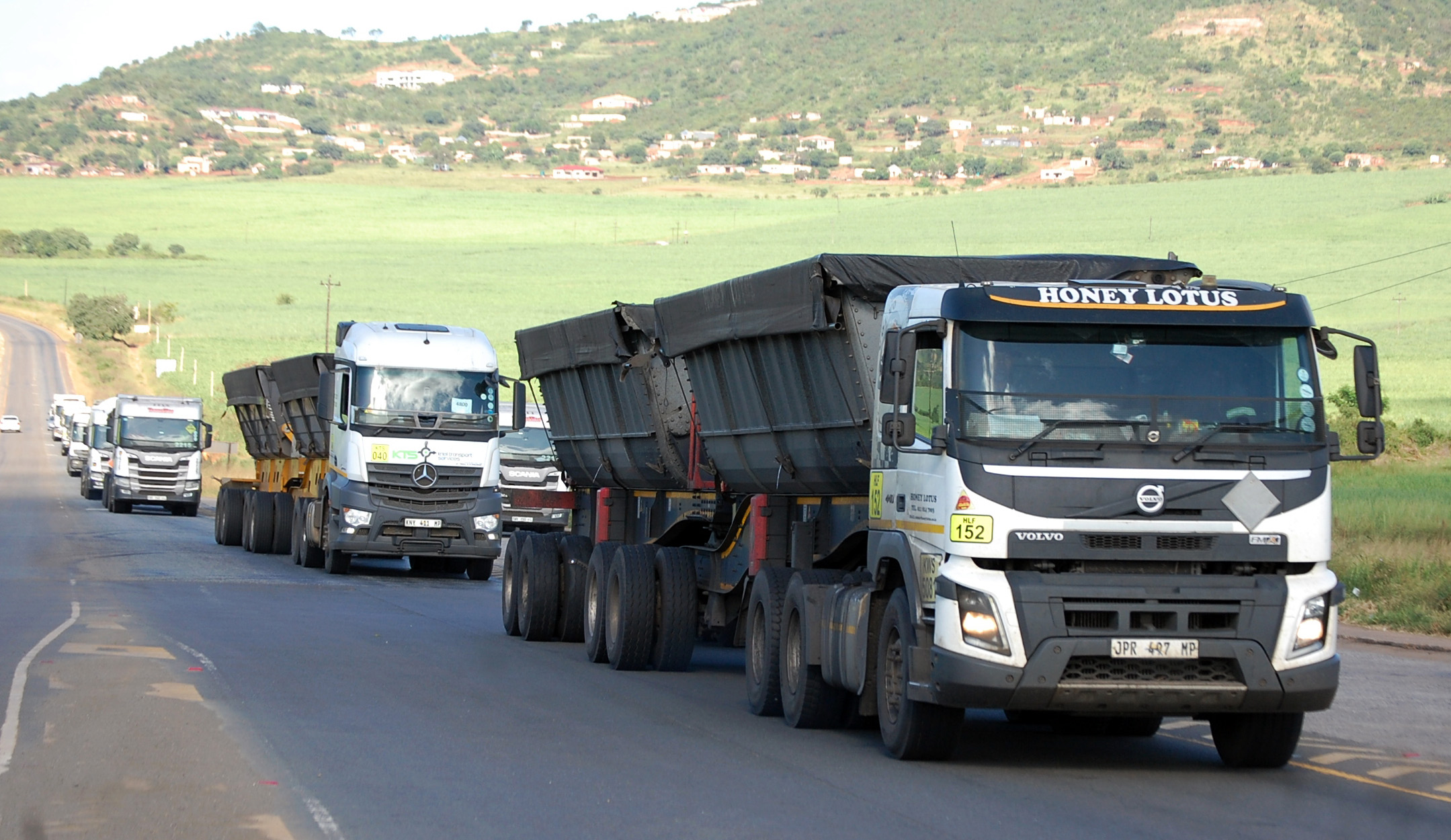
A line of trucks along the N2 freeway in Pongola, northern KZN. Truck traffic worries residents because of the risk of accidents. (Photo: Phumlani Thabethe)
Even before demand for coal spiked as a result of energy shortages in Europe caused by Russia’s invasion of Ukraine, the N2 linking Mpumalanga’s coalfields with Richards Bay was becoming clogged with heavy trucks.
On any given day, heavy-duty vehicles can be seen from the N2 off-ramp to the John Ross Highway, backed up for kilometres – almost to the Enseleni Nature Reserve – waiting to gain entry to the Richards Bay terminal.
Long queues at Richards Bay
It was raining heavily when Daily Maverick arrived at Transnet’s coal terminal in Richards Bay. A long line of trucks was parked on the side of the road, their drivers waiting for their turn to get the token that permits them to dump their cargo before rushing back to the coalfields for another load.
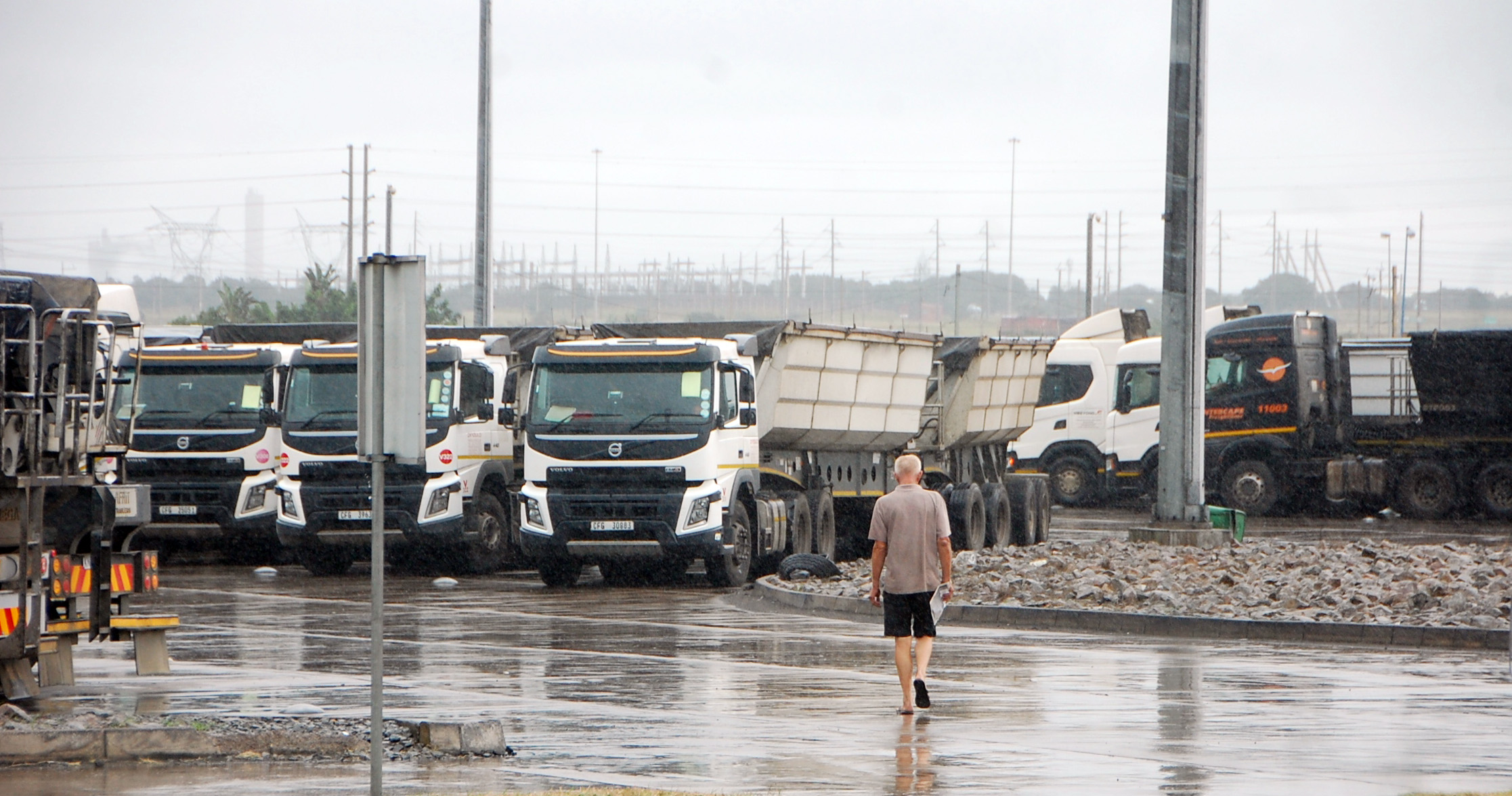
Trucks line up to enter Richards Bay port on 25 January 2023. (Photo: Phumlani Thabethe)
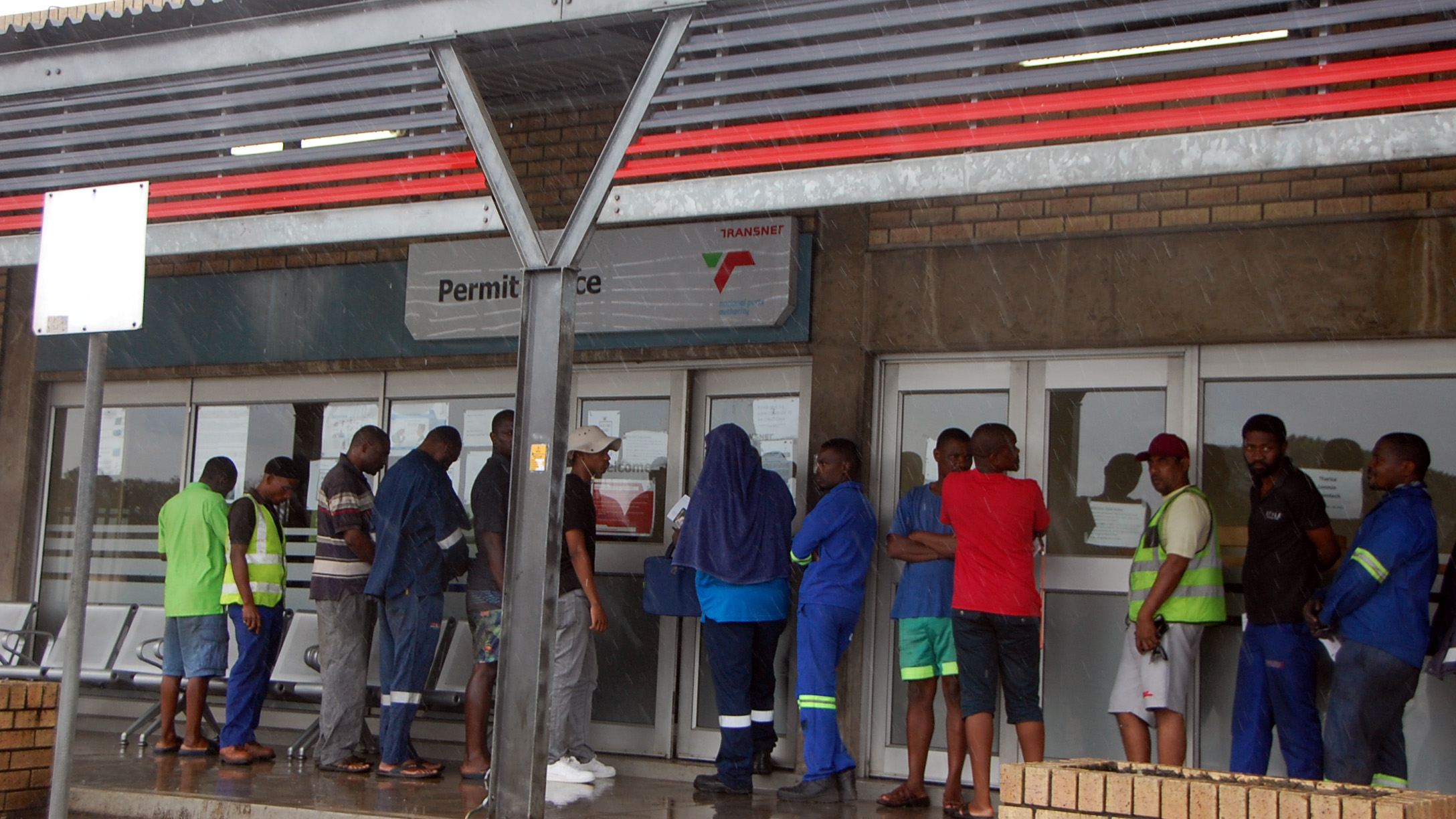
Truck drivers queue at the permit office before entering the Richards Bay port on 25 January 2023. (Photo: Phumlani Thabethe)
Most drivers said they pick up their loads from coal mines in Witbank and other parts of Mpumalanga’s Highveld, which accounts for about 75% of South Africa’s coal production. Other drivers reported ferrying loads from mines in Limpopo, the Free State and other parts of KwaZulu-Natal – provinces that have huge deposits of coal to supply an energy-scarce world market.
South African coal is in growing demand and is fetching high prices. In some cases, drivers are being pushed hard and corners are cut to meet that demand, and there are accidents.
“There is not much that we can do,” said one of the Mpumalanga-based drivers in the queue (who asked not to be named). “Our employers are paying us to deliver big quantities of coal to the overseas market,” he said.
It is on the roads leading to and from Richards Bay that trucks have become a danger to residents and motorists alike. Some rural communities have held protests demanding that the traffic be reduced to minimise the number of accidents.
Truck ban rescinded
The uPhongolo Local Municipality and, more recently, the Mthonjaneni Local Municipality, banned trucks from travelling on their roads after a spate of deadly accidents.
Last week, the IFP-run Mthonjaneni Local Municipality announced a ban on coal trucks passing through Melmoth on the R66. The municipality said only trucks carrying goods such as foodstuff and timber would be allowed to travel through the town. This decision was reversed after players in the trucking industry threatened to go to court.
Pongola horror smash
In one of the deadliest crashes last year, 21 people died in September, including 18 children, when a truck smashed into a bakkie transporting school pupils on the N2 between Pongola and Itshelejuba.
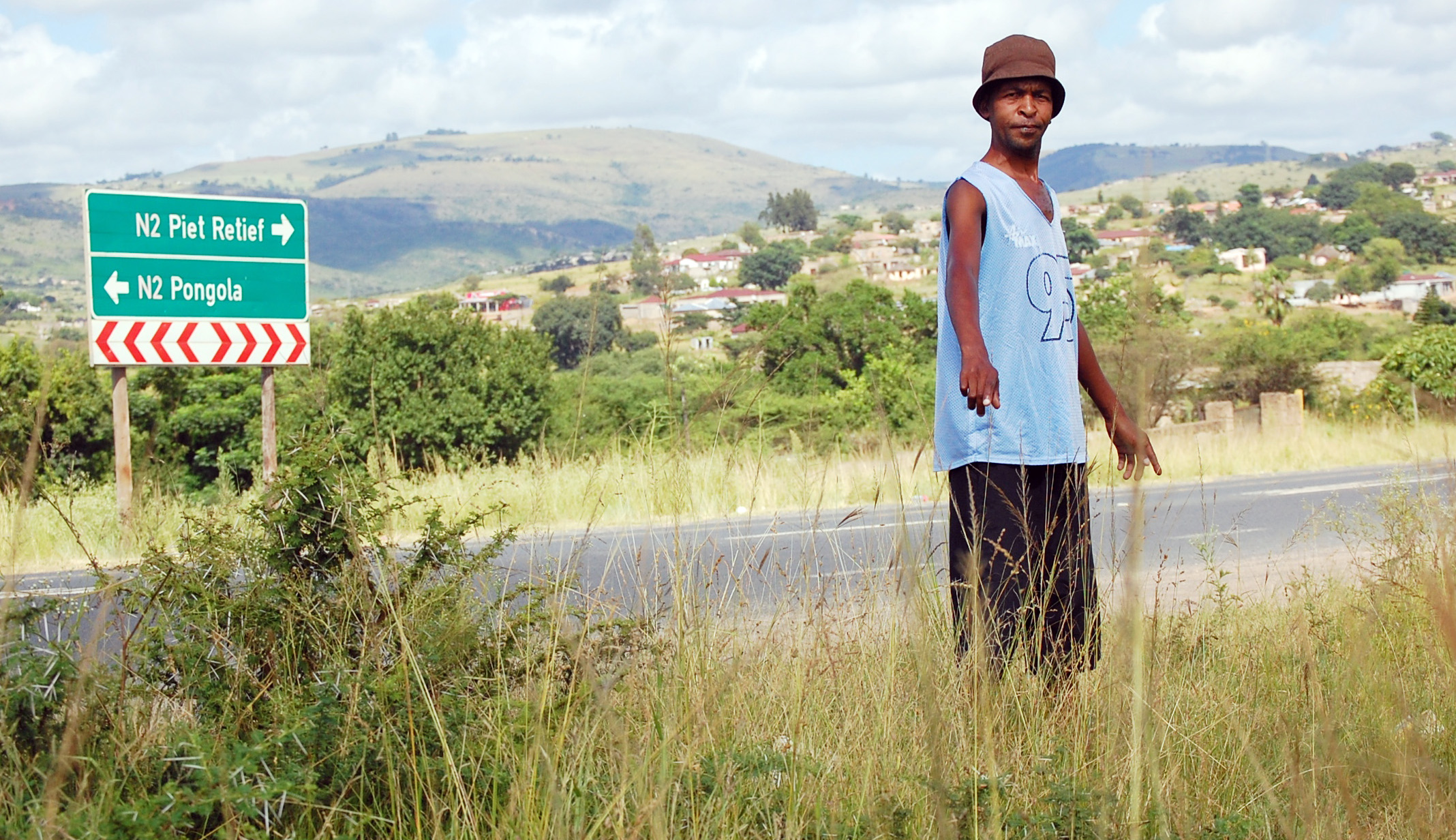
Albert Khumalo from Pongola points to the spot where a truck accident killed 18 schoolchildren last year. (Photo: Phumlani Thabethe)
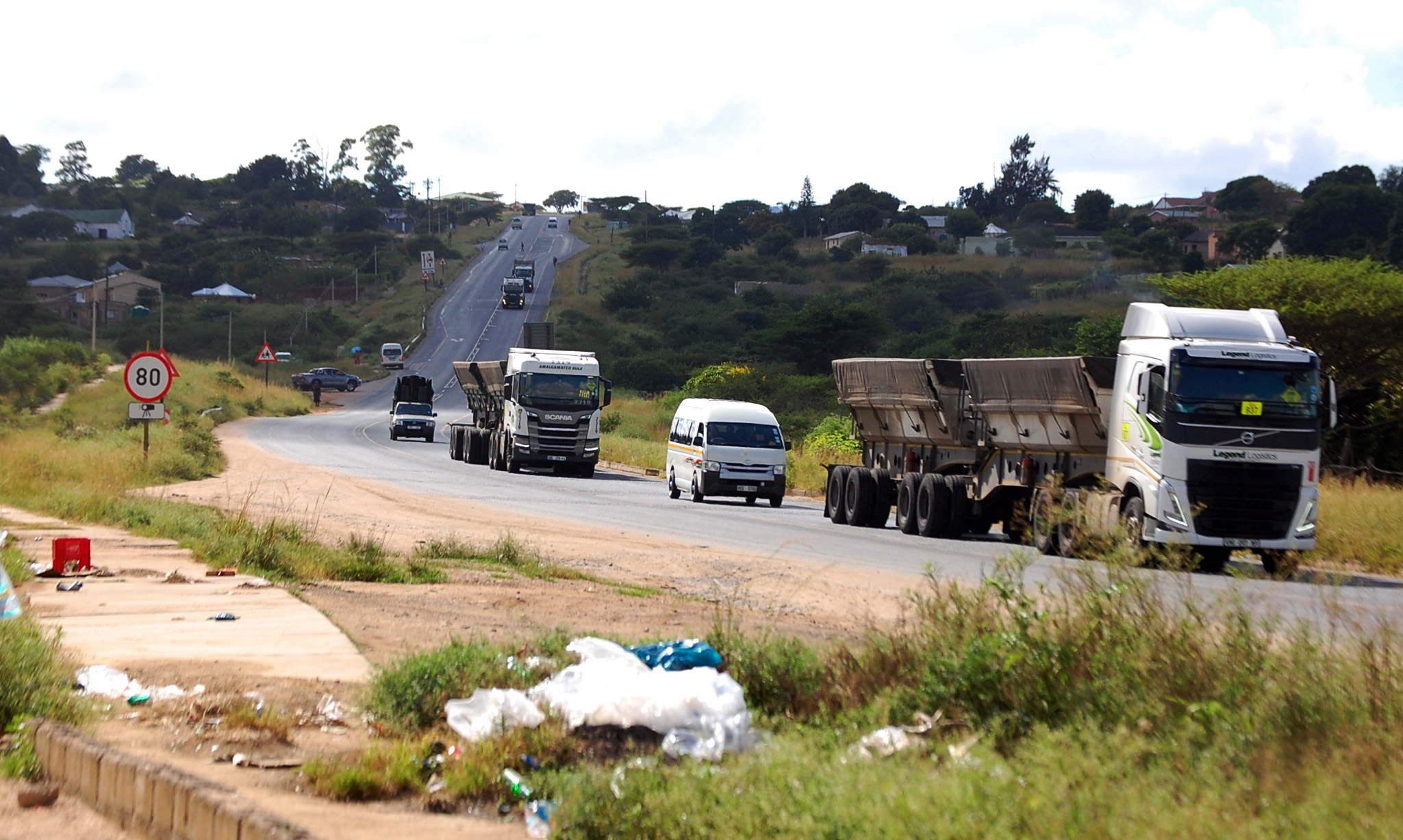
The section of the N2 near Pongola in northern KZN where schoolchildren were killed in a truck crash. (Photo: Phumlani Thabethe)
The truck driver, Sibusiso Siyaya, has appeared several times in the Pongola Magistrates’ Court on charges of culpable homicide.
Albert Khumalo, 54, was among those who witnessed the accident.
“I saw it with my own eyes as the truck was dragging the scholar transport van for metres as helpless children were screaming for help,” he said.
“In the past few years, we have been seeing an increase in trucks using this road and killing pedestrians, but we never imagined that it would come this far.
Visit Daily Maverick’s home page for more news, analysis and investigations
“It is clear that some people are making huge profits by transporting coal and other minerals, while we are poor and vulnerable. As if that was not enough, we now have to contend with reckless, dangerous trucks,” he said.
Three victims who died in that accident were learners at Thembokuhle Primary School, near the N2 highway. One teacher, who asked not to be named, said the problem villagers have is that schools flank the busy N2 highway, and learners risk their lives running from one side to the other.
“The trucks are not only a problem for kids or for pedestrians. It is a problem for many motorists, too. It used to take between 15 and 20 minutes to drive from the school to the Pongola town centre. Now, on a very busy day, it takes you more than an hour and 20 minutes because there are long queues of trucks everywhere,” said Khumalo.
‘Too many trucks’
Neli Mathenjwa is employed by the provincial transport department to flag down traffic at eSigungwini village, on the N2 a few kilometres outside Pongola. Her job is to ensure that school children and pedestrians cross the road safely.
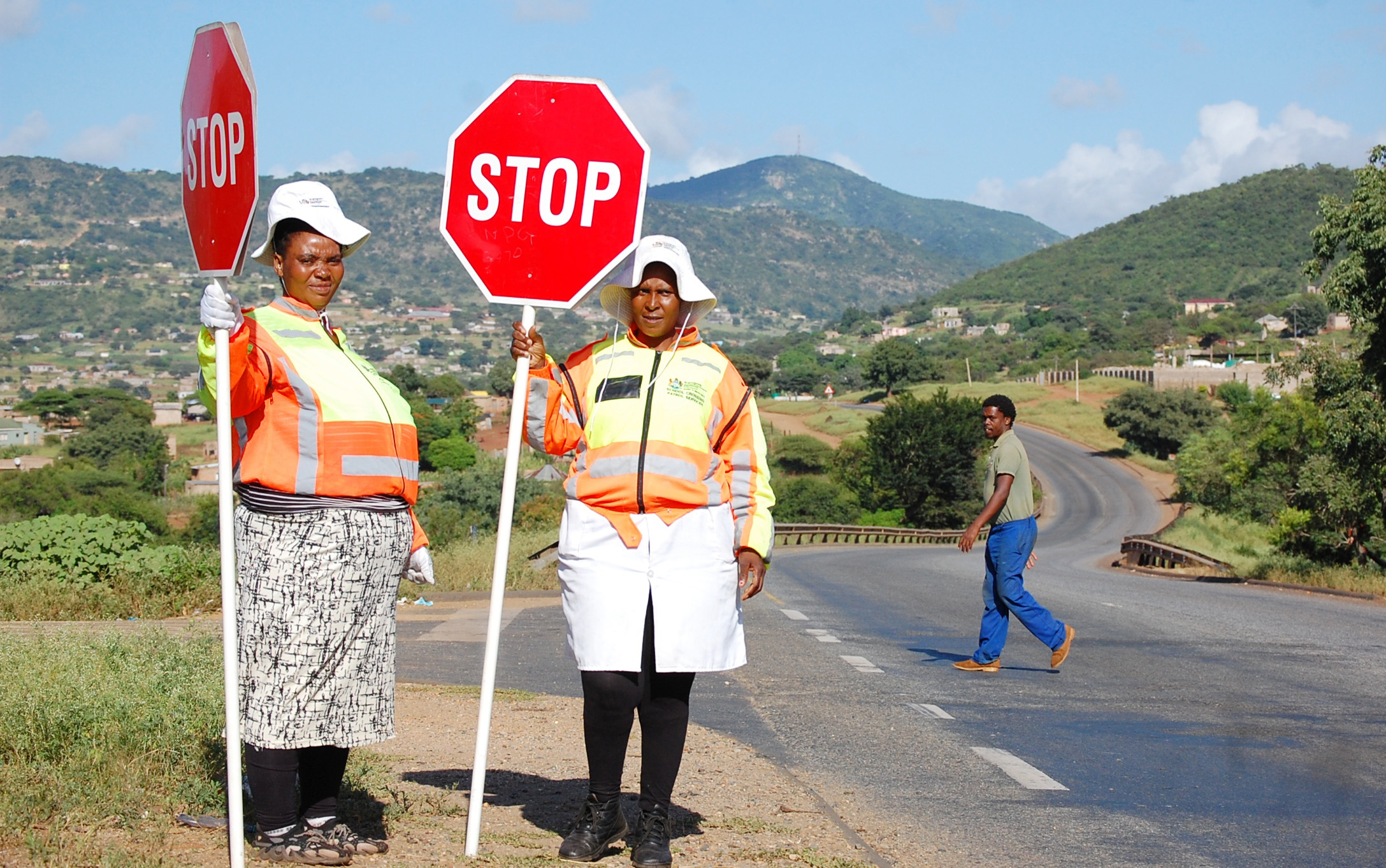
Lungile Xulu (left), with Nelisiwe Mathenjwa, help schoolchildren to cross the N2 near Pongola in northern KwaZulu-Natal. (Photo: Phumlani Thabethe)
“In the past five years there have been too many trucks passing here. There have been many accidents, claiming the lives of pupils and adults alike,” she said.
“Trucks do stop when we indicate that children are waiting to cross the road. But I have observed that some trucks travel here at very high speed,” said Mathenjwa.
Thabo Mdluli, a truck driver based in eMalahleni in Mpumalanga, said truck drivers, motorists and even pedestrians are forced to disobey the rules of the road due to congestion.
“It is true that there are too many trucks on this road. Even if the government were to build two lanes each way, it would still not be enough for the volume of traffic that passes through here.
“The trucks here travel very slowly in the convoy. Sometimes you find school kids and others who are walking along the road trying to climb on a truck to get a lift. I think there should be awareness programmes where children learn about the dangers of doing this,” he said.
A boon for some
Although many communities are against the growing menace of trucks on the N2, some small businesses are doing a roaring trade.
Gugu Ntshangase, 52, has a stall near Pongola’s main truck stop. She uses a gas cooker to prepare meals such as pap and meat and vetkoek, which she sells to truck drivers. She uses the money to support six family members.
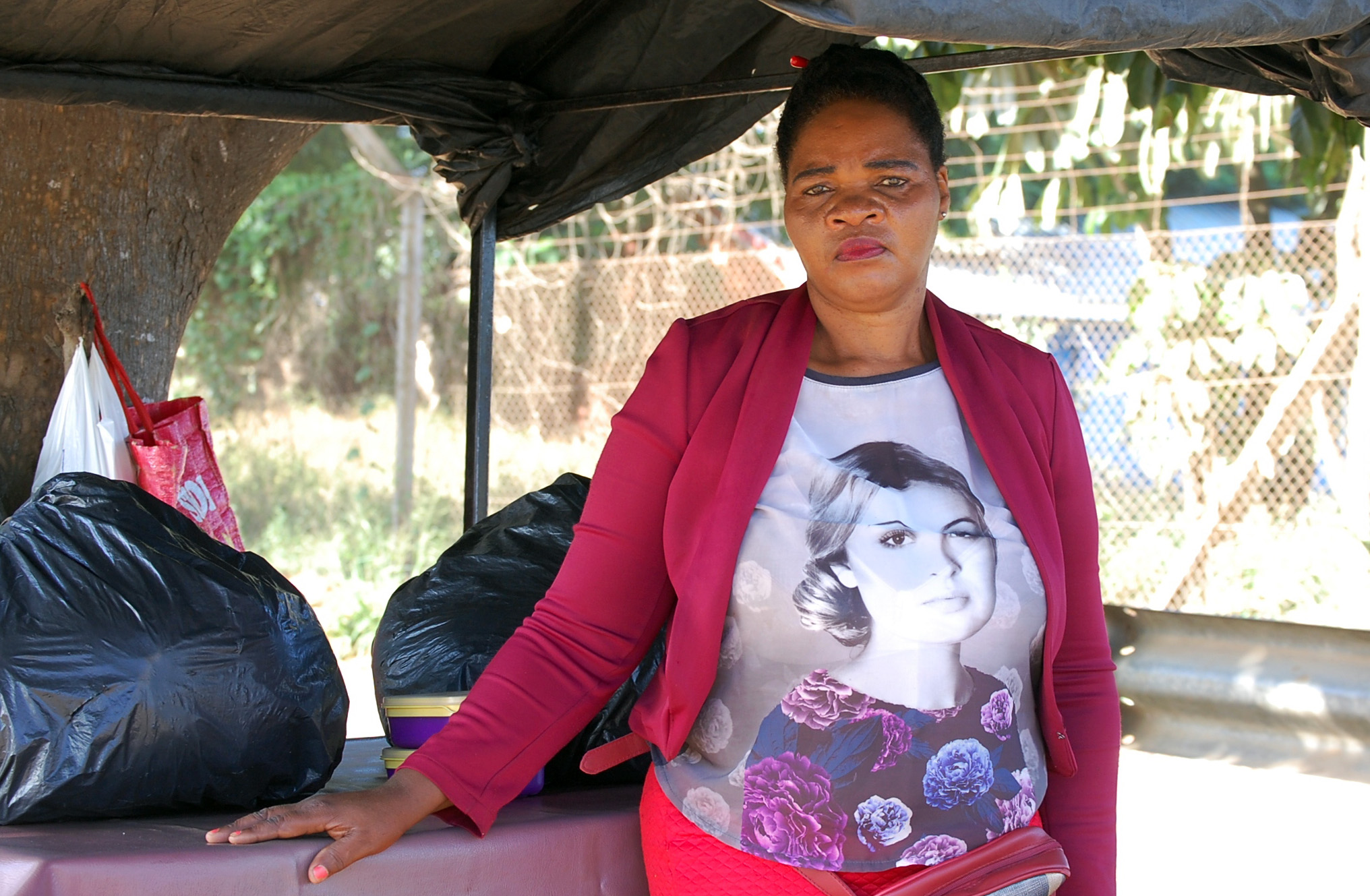
Gugu Ntshangase, a Pongola street vendor. (Photo: Phumlani Thabethe)
“We hear about accidents… It’s very sad. But for us, truck drivers provide business. Just a few weeks ago, when trucks were prevented from passing through here in Pongola, we went home empty-handed,” she said.
In reply to a question from the Democratic Alliance’s shadow MEC for Transport in September 2022, the KZN department of transport said it was concerned about the growing number of trucks on the province’s roads.
The KZN premier’s office said, in response to the DA, that there has been a five-fold increase in heavy-duty traffic on the Pongola N2 highway alone, from 1,000 to 5,000 trucks a day.
‘Fix the railways’
Gavin Kelly, CEO of the Road Freight Association (an organisation that lobbies on behalf of truck owners), said the high volumes of heavy-duty traffic on KZN roads, particularly on the N2 to Richards Bay, is because of “a huge demand for coal at the moment… one of the biggest sources of coal in the world is South Africa.
“The second cause is that we cannot move such a large volume of coal by rail, as the Transnet rail network has collapsed. Until the rail network has been sorted out, there will be truck traffic on the way to the coal terminal,” Kelly said.
He pointed out that a single goods train is able to carry volumes equivalent to those carried by up to 200 trucks.
Kelly said a decent rail network in South Africa would significantly reduce the number of trucks on the road and lead to fewer accidents.
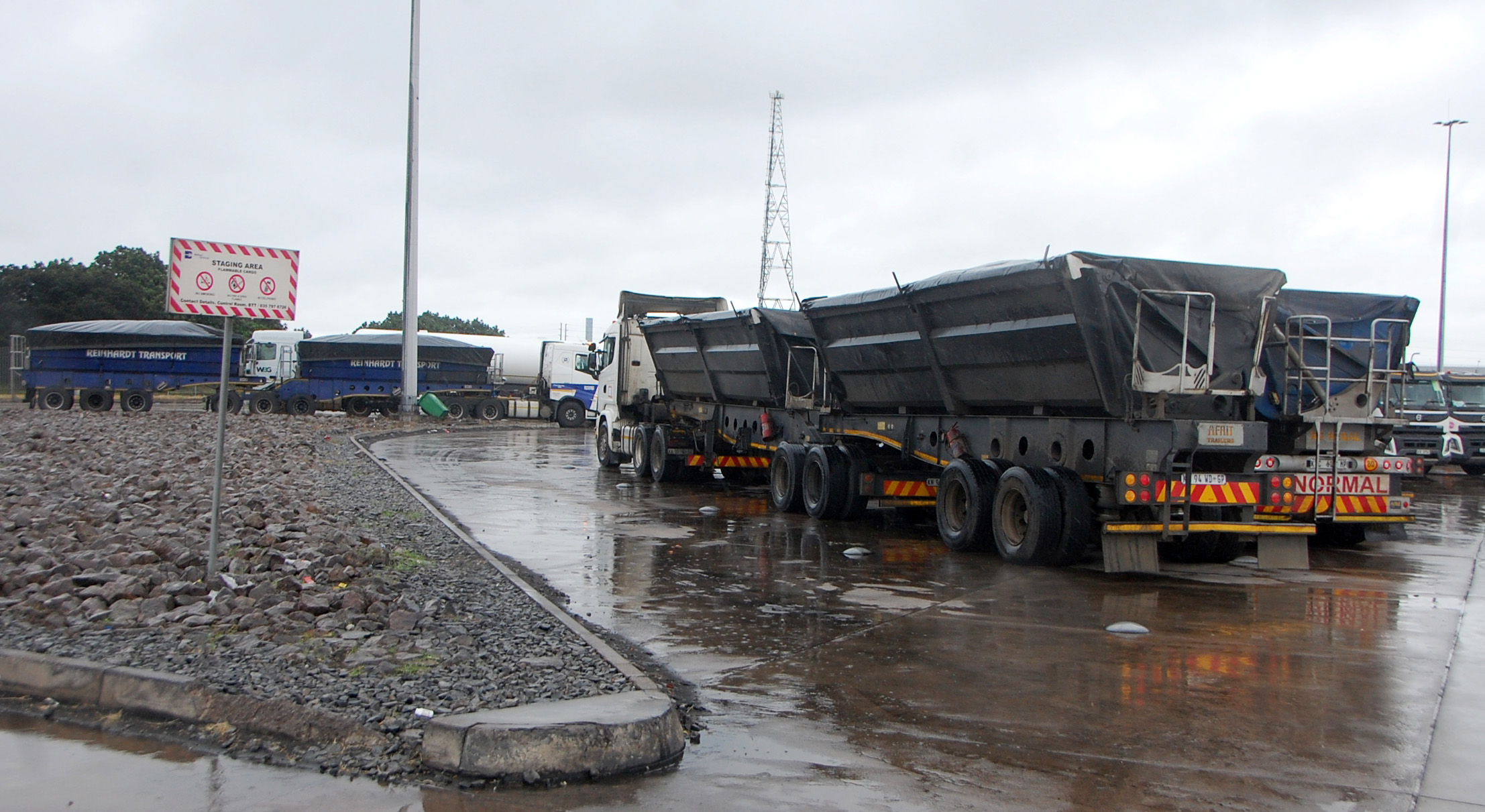
Trucks line up to enter Richards Bay port on 25 January 2023, (Photo: Phumlani Thabethe)
“The only solution is for the government and Transnet to move with speed to move those volumes of coal and other goods to the international markets.
“The Road Freight Association has been calling on Transnet to make concessions that would allow the private sector and transport and logistics experts to run the rail from Johannesburg and other major centres to the ports. It is good that Transnet is now starting to articulate these solutions,” he said.
Read more in Daily Maverick: “Will companies bite at the latest Transnet offer to partner?”
In the latest and most deadly accident involving a heavy vehicle, a gas tanker got stuck under a bridge in Boksburg on Christmas Eve last year and exploded, killing 41 people. The tanker had been travelling from Durban harbour to Botswana.
The 32-year-old driver was initially arrested on multiple charges, but was later released. Charges were dropped.
Possible curfews
KZN premier Nomusa Dube-Ncube said her government was concerned that the province’s roads and highways had become so dangerous in recent months.
“It is alarming that in October 2022 alone, more than 55 truck accidents were reported in the province. It is for this reason that we are exploring various ways to put an end to road carnage involving trucks.
“This may include enforcing a curfew on freight trucks and redirecting vehicles to less busy roads. We are also engaging with the freight and logistics industry… our roads cannot be turned into mass grave sites and places of untimely deaths,” Dube-Ncube said.
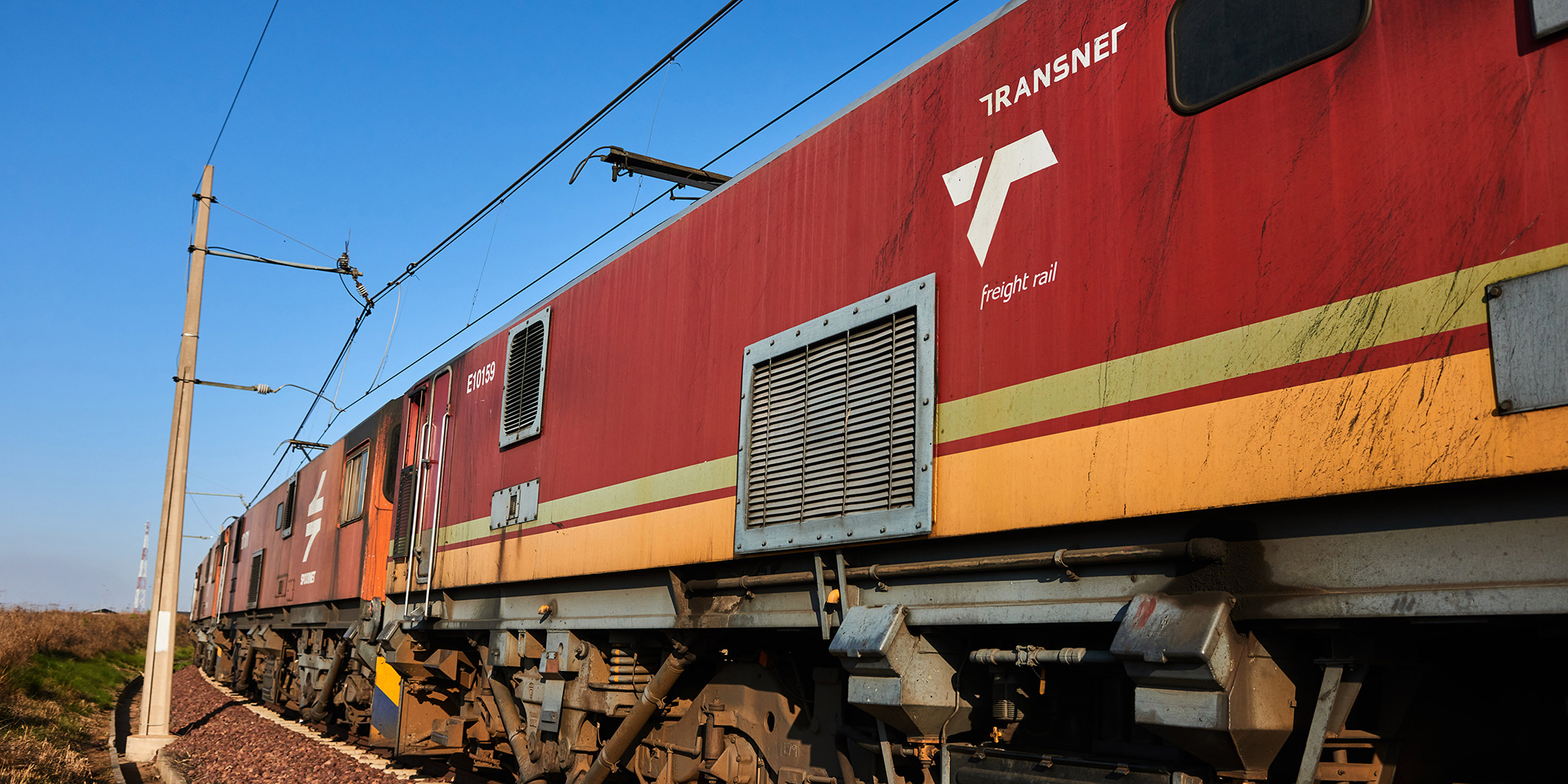
Transnet’s largest division, Transnet Freight Rail, issued a request for qualification (RFQ) at the end of January, calling for interested private-sector players to bid for a 20-year lease to operate its rail container corridor between Johannesburg and Durban. (Photo: Waldo Swiegers / Bloomberg via Getty Images)
According to a report on News24, Transnet Freight Rail (TFR) will need more than R80-billion to restore its rail network to a standard capable of carrying the loads required to satisfy import and export demands.
There was a positive development on 26 January this year, when TFR announced that it would “issue a Request for Qualifications to the market to identify parties interested in entering into an Operating Lease with TFR for the operation and maintenance of the Container Corridor (the line between Johannesburg and Durban) for a period of 20 years”.
“The Container Corridor rail mainline is a fully electrified, double-tracked rail line running from Booth in KwaZulu-Natal to Union in Gauteng. While the mainline is 670km in route length, the double line and various major marshalling yards and enabling rail lines takes the total track length of the Container Corridor to 1,621km.”
Should this plan come together, the number of heavy trucks travelling to and from KZN’s harbours could be significantly reduced. DM


















 Become an Insider
Become an Insider
YES – so true! We need our nation-wide railway to be fully and more, restored! It will provide so much permanent employment. If Did Bodre could do it, surely we can too! And another thing – wasn’t deRuiter actually BEING the ‘MINISTER OF ELECTRICITY’ ? He was making progress! Who could do a better job?
Cause and effect. Let us not forget that the destruction of the railway infrastructure was primarily due to rampaging RET forces of ANC/EFF thugs, and that the thuggish behaviour of KZN Zulu taxi-drivers and other hauliers was the reason that heavy goods remained on the roads as they fought to maintain revenue opportunities.
These are the two fundamental reasons for the mess we are in; and why it is essential that President Ramaphosa gets to grips with this wild, violent, largely ANC faction.
Not different in Mpumalanga on the N4 to Maputo. And it all leads back to one thing – cANCer.
I agree 100% with the article but nowhere does it talk about the lack of policing. I do some conservation work in northern KZN and travel this road regularly. The only traffic police I have seen recently were in Pongola town itself. Because of the very hilly nature of the terrain, fully loaded trucks struggle up hills at 20km/h and go hurtling downhill at 120km/h. Motorists in normal vehicles become extremely frustrated and eventually try to pass trucks uphill on double white lines. The other problem is the road surface and potholes which are sufficiently large to cause a normal vehicle to overturn. Even if the coal price falls making road transport uneconomic, the trucks carrying chrome ore will continue to use and destroy these roads. Rail is the only solution, but I don’t believe the truck mafia will permit this. Rail infrastructure will continue to be sabotaged to allow them to make their profits. Another ANC catastrophe!!
Cadres from the ANC, EFF and their like have wasted our money on fancy houses, fast cars, expensive clothes, etc. Can’t THEY re-capitalise and revive the current rail transport goods and passenger mess? They could impress their populace and make a lot of money with a clear conscience?